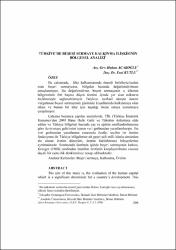| dc.contributor.author | Acaroğlu, Hakan | |
| dc.contributor.author | Kutlu, Erol | |
| dc.date.accessioned | 2014-12-12T13:30:41Z | |
| dc.date.available | 2014-12-12T13:30:41Z | |
| dc.date.issued | 2008-06 | |
| dc.identifier.citation | Acaroğlu, H , , , Kutlu, E . (2008). TÜRKİYE’DE BEŞERİ SERMAYE KALKINMA İLİŞKİSİNİN BÖLGESEL ANALİZİ . Afyon Kocatepe Üniversitesi İktisadi ve İdari Bilimler Fakültesi Dergisi , 10 (1) , 299-326 | |
| dc.identifier.issn | 1302-1966 | |
| dc.identifier.uri | http://hdl.handle.net/11630/1285 | |
| dc.identifier.uri | https://dergipark.org.tr/tr/pub/akuiibfd/issue/1629/20434 | |
| dc.description.abstract | Bu çalışmada, ülke kalkınmasında önemli belirleyicilerden olan beşeri sermayenin, bölgeler bazında değerlendirilmesi amaçlanmıştır. Bu değerlendirme, beşeri sermayenin o ülkenin bölgelerinin fert başına düşen üretimi içinde yer alan miktarın ölçülmesiyle sağlanabilmiştir. Böylece, tarihsel süreçte önemi vurgulanan beşeri sermayenin günümüz koşullarında kalkınmaya olan etkisi ve bunun bir ülke için taşıdığı önem ortaya konulmaya çalışılmıştır.
Çalışma boyunca yapılan analizlerde, TİK (Türkiye İstatistik Kurumu)’den 2003 Hane Halkı Gelir ve Tüketim Anketince elde edilen ve Türkiye bölgeleri bazında yaş ve eğitim sınıflandırılmasına göre ücret-maaş gelirlerini içeren veri grubundan yararlanılmıştır. Bu veri grubundan yararlanma esnasında özetle, seçilen bir üretim fonksiyonu ile Türkiye bölgelerine ait gayri safi milli hâsıla cinsinden ele alınan üretim düzeyleri, üretim faktörlerince bileşenlerine ayrılmaktadır. Sonrasında üretimin içinde beşeri sermayenin katkısı, Krueger (1968) tarafından önerilen üretimin karşılaştırılması esasına dayalı bir eşitsizlik denklemince hesap edilmektedir. | en_US |
| dc.description.abstract | The aim of this study is, the evaluation of the human capital which is a significant determiner for a country’s development. This evaluation can be maintained by measuring the amount of the human capital takes part in that countries’ regions per human’s production. Thus, the effect to the development in nowadays for the human capital which has an important place in historical duration and the importance of this situation for a country is shown.
For the analysis during this study, it is helped by the data which consists 2003 household income and consumption survey that categorize, Turkish Region’s according to their age’s, education’s and wage’s that has taken from TSI (Turkey Statistical Institude). According to this data, a production function is chosen first and production levels according to gross national production per capita that belong to Turkish regions are seperated by their production factors. Then the contribution of human capital in the production is calculated by an inequality equation that compares production proposed by Kruger (1968). | en_US |
| dc.language.iso | tur | en_US |
| dc.publisher | Afyon Kocatepe Üniversitesi, İktisadi ve İdari Bilimler Fakültesi Dergisi | en_US |
| dc.rights | info:eu-repo/semantics/openAccess | en_US |
| dc.subject | Beşeri Sermaye | en_US |
| dc.subject | Kalkınma | en_US |
| dc.subject | Üretim | en_US |
| dc.title | Türkiye’de beşeri sermaye kalkınma ilişkisinin bölgesel analizi | en_US |
| dc.type | article | en_US |
| dc.relation.journal | Afyon Kocatepe Üniversitesi, İktisadi ve İdari Bilimler Fakültesi Dergisi | en_US |
| dc.department | Eskişehir Osmangazi Üniversitesi, İktisadi İdari Bilimler Fakültesi | en_US |
| dc.department | Anadolu Üniversitesi, İktisadi İdari Bilimler Fakültesi | |
| dc.identifier.volume | 10 | en_US |
| dc.identifier.startpage | 299 | en_US |
| dc.identifier.endpage | 326 | en_US |
| dc.identifier.issue | 1 | en_US |
| dc.relation.publicationcategory | Makale - Ulusal Hakemli Dergi - Kurum Yayını | en_US |



















